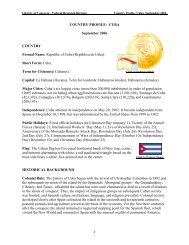1 - American Memory
1 - American Memory
1 - American Memory
Create successful ePaper yourself
Turn your PDF publications into a flip-book with our unique Google optimized e-Paper software.
196<br />
nations where government controls and operates industry, both man-<br />
agement and workers.<br />
At the same time, I also have a deep commitment to the public in-<br />
terest, to the general welfare of our citizens. On those occasions when<br />
collective bargaining, mediation, conciliation, and other normal proc-<br />
esses have failed to settle labor-management disputes, then in the<br />
public interest, for the public good, something must be done.<br />
This is why I have worked hard to secure remedial legislation to<br />
give Hawaii and the other Pacific Islands under the <strong>American</strong> flag<br />
security in their oceanborne commerce with the west coast.<br />
As you know, only 2 months ago, on July 17. the Senate debated<br />
and approved S. 1566, the Hawaii and U.S. Pacific Islands Surface<br />
Commerce Act. which I coauthored and cosponsored with my colleague<br />
from Hawaii, Senator Daniel K. Inouye, and which is substantially<br />
similar to the bill before your subcommittee, H.R. 7189.<br />
As I told my colleagues during that debate, I can recall no other<br />
legislation in my 15 years in the Senate since Hawaii statehood whose<br />
enactment has been of greater importance to the people of my State.<br />
It is only through such legislation that the people of the island State<br />
of Hawaii can he safeguarded from the disastrous impact of stoppages<br />
in shipping operations on the west coast—stoppages which have dis-<br />
rupted our ocean lifeline for a total of 464 days in seven major strikes<br />
and for more than 1.000 days in scores of lesser strikes since World<br />
War II.<br />
I am deeply gratified that the Senate responded to Hawaii's appeal<br />
by voting passage of S. 1566 by the decisive margin of 58 yeas to<br />
39 nays.<br />
CONTINUOtIS OCEAN SHIPPING ESSENTIAL FOR HAWAII<br />
To briefly recapitulate my earlier testimony, the geographical posi-<br />
tion of Hawaii, nearly 2.500 miles distant from the U.S. mainland,<br />
renders the island State extraordinarily dependent upon and vulner-<br />
able to interruptions of a single mode of transportation—ocean ship-<br />
ping—which moves nearly all of the imports and exports essential for<br />
our people and economy. To cut into or sever that ocean lifeline is to<br />
cut to the very heart of Hawaii's economic health and security.<br />
Sea transportation normally carries 99 percent of all goocls which<br />
travel between Hawaii and the U.S. mainland. Aircargo, which carries<br />
the remaining 1 percent, can expand in an emergency to carrj- at most<br />
only 3 percent of normal freight tonnage.<br />
Approximately 80 percent of all physical commodities purchased<br />
by Hawaii's 881,000 people are imported, primarily from the U.S.<br />
mainland, and almost entirely shipped from the west coast. Recent<br />
figures indicate 79.5 percent of our oceanborne imports arrive from<br />
the west coast ports, 2.3 percent from tiie east coast, and 18.2 percent<br />
from foreign sources, excluding petroleum products.<br />
Almost without exception, tne goods and supplies essential to<br />
modern living in Hawaii are either imported or import dependent. To<br />
cite one example, our construction industrv requires imports of lum-<br />
ber, nails, plumbing fixtures, roofing, and even the silica sand and<br />
gypsum rock needed to produce cement and concrete products.



![Albert Einstein Papers [finding aid]. Library of Congress. [PDF ...](https://img.yumpu.com/21604228/1/190x245/albert-einstein-papers-finding-aid-library-of-congress-pdf-.jpg?quality=85)





![American Colony in Jerusalem Collection [finding aid]. Library of ...](https://img.yumpu.com/17941275/1/190x245/american-colony-in-jerusalem-collection-finding-aid-library-of-.jpg?quality=85)



![Piccard Family Papers [finding aid]. - American Memory - Library of ...](https://img.yumpu.com/17941234/1/190x245/piccard-family-papers-finding-aid-american-memory-library-of-.jpg?quality=85)


